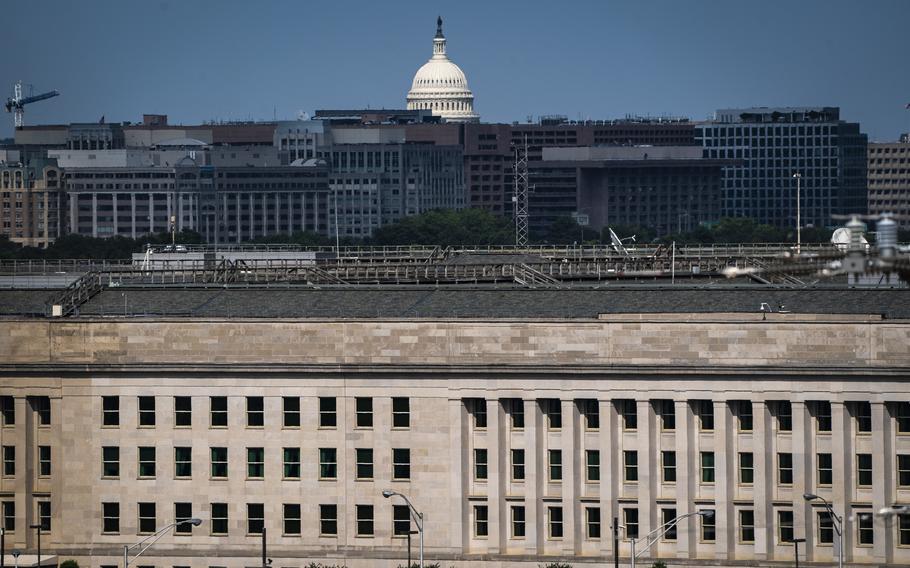U.S.
Defense Department firings expected to start soon, officials say
The Washington Post February 19, 2025

The Pentagon in Arlington, Virginia. (Jabin Botsford/The Washington Post)
The Trump administration has directed defense agencies to turn over a list of their probationary employees by the end of Tuesday, with the expectation that many could be fired as soon as this week, according to five people familiar with the matter.
The directive coincides with the arrival at the Pentagon of personnel from billionaire tech mogul Elon Musk’s Department of Government Efficiency, which has overseen the firing of thousands of probationary employees in other federal agencies and coordinated the dismantling of the U.S. Agency for International Development.
It was not immediately clear whether any probationary employees in the Defense Department will be exempt from plans to reduce headcount, but the expectation is that many will not, said people familiar with the matter who, like some others, spoke on the condition of anonymity to discuss internal deliberations.
The Pentagon referred questions to the Office of Personnel Management (OPM), which has had a leading hand in reshaping the government during President Donald Trump’s first month in office. Spokespeople for the OPM and DOGE did not respond to requests for comment.
If implemented widely, cuts to probationary employees across the Defense Department could result in thousands of dismissals. The Pentagon, with a budget of more than $840 billion, is the federal government’s largest agency. It has about 950,000 civilian employees, including tens of thousands of military veterans, with roles ranging from welders responsible for vehicle maintenance to administrative staff assisting in offices and engineers overseeing highly specialized weapons programs. Probationary employment for federal workers generally lasts one year but can extend to two or three years in some positions.
The Pentagon also oversees about 1.3 million active-duty service members and nearly 800,000 more who are in the National Guard and reserves, but the Trump administration has exempted service members from its sweeping budget cuts.
Musk’s involvement in Pentagon personnel and budgeting matters will certainly raise questions about potential conflicts of interest. His companies have received billions of dollars in U.S. government contracts, including at the Defense Department, which has a growing interest in the capabilities offered by SpaceX.
One contract for $1.8 billion was awarded to the company to help build a network of spy satellites for the Pentagon’s National Reconnaissance Office in 2021, Reuters reported. The Pentagon also pays for Starlink, a satellite-based internet service that is overseen by Musk and has proved vital for Ukrainian troops to communicate on the battlefield.
Defense Secretary Pete Hegseth last week acknowledged that DOGE was due to arrive at the Pentagon and said he would welcome its teams. He said he already had been in contact with Musk, whom he called a “great patriot, interested in advancing the ‘America First’ agenda” of Trump.
“There are waste, redundancies and headcounts in headquarters that need to be addressed,” Hegseth said while traveling in Stuttgart, Germany. “There’s just no doubt.”
Hegseth cited Defense Department programs examining climate change but said DOGE efforts will be coordinated with his team to make sure they are not “to the detriment of American operational or tactical capabilities.” He affirmed that Musk was accurate to say that “billions of dollars” could be saved in the Defense Department, with the money spent instead on combat troops.
The Musk team has struggled to discern the roles of employees in other departments, leading to mistakes. Last week, some dismissals in the Energy Department were initiated, then paused, after alarm was raised about the effects of the cuts on nuclear defense programs.
Leaders across the Defense Department compiled lists of personnel they believed were mission critical and should be exempt from dismissal. But some staffers said they didn’t really expect to be seriously considered, citing the OPM’s authority to grant such requests and interpretation of guidance that approvals would be rare. Chaos surrounding fast-moving and sudden directives seemed to be a feature, rather than a bug, said a staffer with the U.S. Cyber Command.
One military officer said Tuesday that it was not yet clear how the possible DOGE-mandated cuts may affect his office, which is part of the U.S. intelligence community. He works with five employees considered probationary, performing work he characterized as vital to national security, and is waiting to see whether any will be exempted.
The officer said that in his agency probationary status lasts one year for military veterans and two years for civilians. Some of those hired as Defense Department civilians previously worked as defense contractors in similar roles and are considered experts in their fields, the officer said.
Probationary employees working with classified programs can’t simply be fired, the officer said. They must be escorted off their installation, give up their badge and be formally “read out” of their program, a process that involves debriefings and returning classified information.
“Morale is not great,” the officer said. “No one trusts that they won’t jack this whole thing up.”